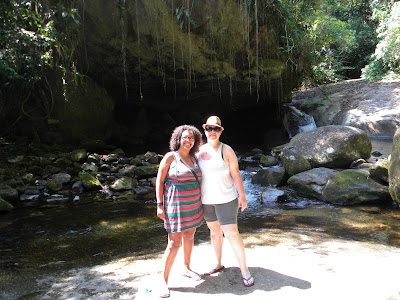N.B. This blog isn’t directed at anyone in particular.
English people like to talk about Americans like they’re
idiots. They’re not idiots, they
wouldn’t be so successful at so many different things if that were the
case. What they do have a tendency towards
is ignorance.
This is because of the way the majority of them are educated
(and I’m not necessarily talking about schooling) – they are not encouraged to
show much interest in anything outside of their borders. They also tend to put different types of
people into stereotype boxes in their minds.
This often means that when they travel outside of their own country,
they suffer from a terrible case of foot-in-mouth disease. They make horrific generalisations about
various different nationalities, races and countries, e.g. everyone in Africa
is starving or has AIDs (your eyes may have widened there – I’m not kidding,
I’ve heard this before), all South Americans are poor/criminals/drug-smugglers,
all Arabs are terrorists, and Canadians are boring (OK, I’ll give them that one
– I lived there for 18 months).
Again, this is not idiocy it’s ignorance. If you’re ignorant, you can learn. Not all
Americans are this way, just a significant majority. I’m half-American myself, and I have plenty
of American friends who are not in any way ignorant.
Now I’m going to get to my point: Americans are not the only
nationality prone to ignorance. Everyone
is. I have recently experienced
jaw-dropping ignorance from Canadians, Brits, Aussies, and various Europeans.
When I think about it, I learnt absolutely nothing about
South America in school. N-O-T-H-I-N-G.
It wasn’t a British colony at some point, so it wasn’t of interest to
the British educational system. So, I
came here only knowing what I’d read in the news or what my Brazilian friends
in London had told me, which is not the best way to educate yourself about a
country. I have learnt a lot since then
but I am definitely no expert.
However, I’m going to clear up a few questions so you don’t
embarrass yourself or seriously offend a Brazilian next time you speak to one/visit
the country:
Brazilians speak
Spanish, right?
NO THEY DON’T. The
national language is Portuguese. Although the languages are similar in a lot
of respects, they sound totally different.
You might run into the odd Brazilian in Brazil who speaks Spanish, but
only in the same way you might run into the odd Brazilian who can speak
English. They generally just speak
Portuguese. If you come here, bring a
goddamn phrasebook for chrissakes.
I didn’t know there
were blonde Brazilians…
* facepalms * Never ever EVER say that to a Brazilian! Brazilians come in all different shapes,
colours, and sizes. There is no
particular ‘Brazilian’ identifying physical feature. Everyone can look like a Brazilian – and I mean
everyone: there is a sizeable Brazilian-Asian community, for instance. I’ve met Brazilians of various different
descents: Japanese, Korean, Bangladeshi, Indian, German, Dutch, Spanish,
Italian…the list is endless.
Is it safe?
Do you walk down dark,
unlit streets in bad neighbourhoods on a regular basis? No, neither do I. So, don’t do it here either and you won’t have
a problem. Don’t flash your iPhone 4S
and your Prada sunglasses around in public and probably no one will take any
interest in you, criminally speaking.
Show off the fact you’re a gringo (talking English at the top of your
voice) and that you’re on holiday, at your peril be it. Basically, don’t be a dick.
I’ve heard they’re really lazy and just party all the
time…
It’s true, Brazilians know how to
enjoy themselves, but not at the expense of making a living. Hardworking Brazilians work a hell of a lot
harder than hardworking Europeans. At
the top of the scale, it is pretty common for professionals (accountants,
lawyers etc.) to work 10/12-hour days in São Paulo as a matter of course – not
just under special circumstances. I have
students who frequently work longer hours a couple of times a week (and manage
to fit in study time for English and MBAs).
At the bottom of the scale, people in what we would consider the working
class often hold down more than one job or business to make ends meet.
Is there malaria?
No, this isn’t
Africa. Read the FCO website you lazy git. No malaria, small risk of Yellow Fever – but
only in the north of the country. Get a
jab and do your bloody homework.
It’s amazing how much they travel, considering…
Considering what,
exactly? That they’re poor? They have rich people here too, y’know. And they have a rapidly expanding middle
class. They can probably afford to travel
more than you can, because your economy is crap and theirs isn’t.
Do they have cars?
Fuck. Off.
Helpful tip:
Don’t put down Brazil as a country
in conversation with a Brazilian. Don’t bitch
about their education system, don’t criticize their government, and don’t tell
them how corrupt their politicians are.
Brazilians are not in the habit of putting other people down (unless
they’re talking about Argentina or Paraguay), so be polite and don’t do it to
them. Brazilians are generally
inquisitive in a positive way and will avoid offence. If you’re British and you have a tendency
towards criticism (which we do), bite your tongue. You inevitably know less about their country
than they do. Don’t be so arrogant and condescending as to tell them what’s wrong with their country. They
are fully aware of their country’s defects, they don’t need you listing them
out. If they offer up a conversation
with national comparisons, it is not an invitation to be negative. If you're going to ask a question/make a statement, ask yourself "would I be offended if someone from another country asked/said this to me about my country?" before you open your mouth. If the answer is "yes", shut up.






























